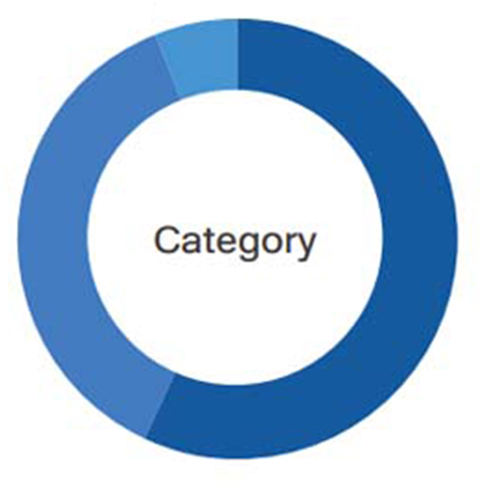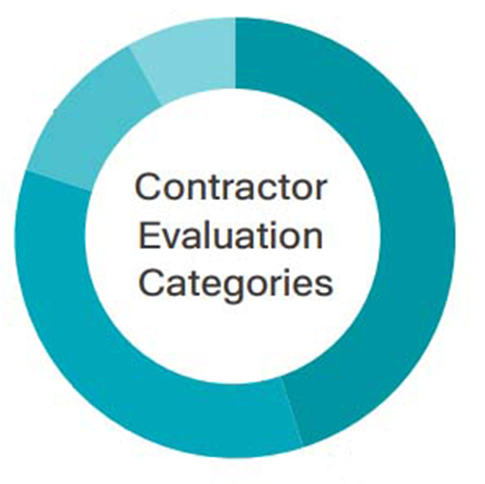Management of the Supply Chains
Owing to the industrial characteristics of steel manufacturing, a large number of manpower would be required for equipment revamping or periodic/annual/ major repairs at the production units for a short period of time. CSC uses contracted workers to cope with the fluctuating demand. Due to the time constraints for production equipment maintenance tasks, contractors located in nearby areas are preferred, thus creating a vast amount of stable job opportunities locally. This is yet another example of CSC fulfilling corporate social responsibilities while maintaining sustainable business operations.
According to “Management Guidelines for CSC Operations, Maintenance, and Environmental Protection Contractors”, operations, maintenance, and environmental protection contractors are to enter long-term or case-by-case contracts with CSC, providing manpower, equipment, and technical support for CSC in maintenance, operations and environmental protection related tasks. These contractors are categorized based on the nature of the tasks, amongst which the ones related to maintenance are the majority.
CSC Improves Working Conditions of Contractor:
- Increase safety and health management fees.
- Establish vacation policies and compensation for working on holidays.
- Establish job safety cultures.
- Regularly review the reasonableness of outsourcing contract fees in line with the basic wage and market prices of raw materials.
New contractors must fill out evaluation forms, disclosing information including primary business activities and verified certifications (ISO 45001/ISO 14001) to prove that they are legally registered, adequately insured, tax-paying companies with healthy financial status. Also, they must genuinely report on the critical occupational safety and/or environmental protection issues for the past three years to allow respective departments to classify and evaluate as well as arrange on-site inspections. All contracts all have basic clauses such as integrity, anti-corruption and intellectual property, and require contractor employees working in CSC must have insurance mandated by the government, and comply with CSC's safety and health work rules. A penalty would be imposed for any violation, and the fine will be designated exclusively to a fund for supervision, correction, and improvement of the safety and health of contractor employees.
The agreements between CSC Plant Engineering & Maintenance Department and service providers are in compliance with regulations. Also, in accordance with the ISO 9001 regulations on contractors, CSC assesses new contractors and reevaluates them every three years to ensure that all contractors abide by national regulations, and no child labor is used or no regulation breaching the right to freedom of association and collective bargaining is in place. CSC also dedicates to the supervision of contractors to enhance the working conditions of their employees and to ensure the compliance with the Labor Standards Act by carrying out inspections on the labor conditions of contractors in general performance evaluations. No incident was reported on use of child labor, forced or compulsory labor, or violation against labor conditions in 2024.
Contractor Evaluation and Assessment
According to "Management Guidelines for CSC Operations, Maintenance, and Environmental Protection Contractors", evaluation units must provide annual evaluation reports of contractors two to four months prior to the expiry date of contract, based on regular evaluations and daily performance, as part of the supporting documents for contract renewal. The “Management Guidelines for Contractor” also states that contract executing units must conduct a monthly evaluation based on contractor's performance and compile the results in the “annual evaluation report”, in which a score below 70 would result in disqualification for contract renewal. No contractors with a score below 70 were reported in 2024.
Protect Support Staff Rights
CSC cares for its contractors in such broad aspects so that they can work with peace of mind and ultimately reduce turnover rate. During the "Outsourcing Strategy Review Meeting" held at the end of each year, CSC ensures that the wage level of its subcontracts is superior than the minimum wage stated in the Labor Standards Act. At the same time, CSC verifies the labor conditions every July to confirm through document review that the minimum basic salary and payment in lieu of annual leave, labor insurance, health insurance, and overtime hours given by contractor employers are in compliance with the Labor Standards Act and the regulations put forth by CSC. Any discrepancies with regulations need to be explained by contractor employers and signed by contractor employees.
Establish Safety Cultures
CSC Contractor Safety and Health Committee was founded in 1983. Plant Engineering & Maintenance Department established "Safety and Health Guidelines for Plant Engineering & Maintenance Department Contractors" in May 1984, to appoint a team consisting of experts from Industrial Safety & Hygiene Department and Plant Engineering & Maintenance Department to assist with the implementation and monitoring of the committee affairs. Recently, the committee members consisting of about 100 contractor companies in the areas of mechanical engineering, civil and steel construction, electrical engineering, and refractories, collaborating towards the common goals of ensuring the safety and health of contractor employees, strengthening labor quality, improving technical quality and establishing safety culture.
Contractor Coaching and Support
Considering the characteristics of a steel plant, CSC prefers to collaborate with experienced contractors. When a contractor receives a low score in the monthly performance evaluation, CSC actively intervenes to provide guidance through a “nurture, educate, and manage” approach. This ensures the contractor’s continued service capability while reducing the potential for major risks. Methods include analyzing daily inspection data to identify deficiencies and conducting special audits. CSC also requires contractor representatives, including safety and health personnel, to attend safety review meetings. These efforts encourage contractors to take proactive ownership of safety management and reduce the likelihood of accidents.
6%
Environmental Protection Contractors and other - 500 PersonnelResponsible for the disposal of industrial waste produced during production.
37%
Operations Contractors - 2,900 PersonnelResponsible for operations-related tasks that require basic technical skills and have only indirect access to production equipment, or involved in non-technical labor works in production and technology divisions and transportation department.
57%
Maintenance Contractors - 4,400 PersonnelResponsible for repair and maintenance of equipment; or repair, manufacture and process of spare parts or test samples in production and technology divisions.

8%
Access Control and Traffic RegulationsIncludes alcohol test failures at entry and violations of traffic regulations.
12%
Outstanding PerformanceContributions that support company operations.
35%
Occupational Safety and Environmental ProtectionIncludes EHS violations, proactive reporting of EHS improvements, and site inspections by contractor supervisors.
45%
Work Quality and Personal ManagementIncludes compliance with labor conditions such as minimum wage, legal leave, Lunar New Year attendance bonuses, and overtime pay.

Contractor Safety and Health Propaganda
Gather contractors every month to announce new safety and health related information and regulations by CSC.
New Contractor ID Issuing Assessment
New contractors must attend mandatory safety trainings and be interviewed by managers of ID issuing organization. (Listed in the Industrial Safety & Hygiene Department's system)
Safety Care
Conduct on a monthly basis. (Listed in the Industrial Safety & Hygiene Department's system)
Proactively Reporting Near-Miss Incidents or Submitting Health and Safety Proposals
Incentivized through rewards.
Implement and Promote Inherent Safety
Urge contractors to comply with CNS 4750, and reinforce by frequent inspections to reduce scaffolding related safety hazards.
Safety Inspections
All levels of management personnel regularly conduct safety inspections at contractors' workplace and keep records.
(Listed in the Industrial Safety & Hygiene Department's system)
Contractor Training
CSC maintenance units are responsible for arranging training courses and certifications based on the health and safety requirements as well as technical skills required for contractors to perform their work at CSC. The training has been proven to be effective. In 2024, contractor workers received a total of 28,696 hours of training in CSC.
| Type | Safety Training | Technical Training | Skill Certification | |||
|---|---|---|---|---|---|---|
| Training Course/ Purpose | New hire training: Designed for new hires to pay attention to all safety hazards in work environment. | Fire watch personnel: Designed to prevent fire accidents. | Corrugated roofing: Designed to prevent safety hazards such as falling through. | Training Course/ Purpose | New hire training: Designed for new hires to pay attention to all safety hazards in work environment. | |
| Contents | General safety and health training, Zero Accident Program exercise, and safety and health regulation propaganda | Hazard identification, firefighting equipment introduction, and flammable item identification | Hazard identification, fall protection solutions, personal protective gear introduction | Contents | General safety and health training, Zero Accident Program exercise, and safety and health regulation propaganda | |
| 2024 | Persons | 4,448 | 459 | 85 | 47 | 0 |
| Number | 6 | 3 | 3 | 8 | 8 | |
| Frequency | 3 times per week | 19 times per year | 11 times per year | 2 times per year | 0 (Canceled due to insufficient participants) | |
| Total Hours | 26,688 | 1,377 | 255 | 376 | 0 | |
